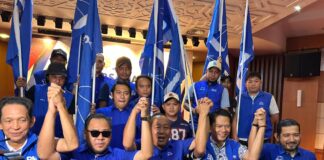By Daniel John Jambun President
Change Advocate Movement Sabah (CAMOS)
KOTA KINABALU: Chief Minister Datuk SeriHajiji Noor wants the public to believe that the GRS-PH alliance is a “genuine partnership” built on mutual trust and shared aspirations.
In truth, it is nothing more than a political arrangement born out of desperation, held together by mutual interests — not principled governance.
Let us not forget: the so-called “Langkah Kinabalu” was not an attack from the outside. It was a direct consequence of GRS’s internal cracks, ambition-driven infighting, and lack of public confidence in their leadership.
Now, Hajiji is thanking Pakatan Harapan for saving his administration. But in doing so, he is admitting two uncomfortable truths:
- GRS No Longer Commands a Mandate of Its Own
If not for PH’s support in January 2023, GRS would have collapsed. This means the government standing today is not the one Sabahans voted for in 2020.
GRS has effectively surrendered Sabah’s political direction to Malaya-based coalitions — the very thing they once claimed to oppose.
Far from being a local party champion, GRS is now dependent on PH’s mercy — making their “Sabah First” narrative a hollow slogan.
- Political Stability ≠ Progress or Good Governance
Hajiji claims that the GRS-PH alliance brought “stability and development.” But where is the evidence?
Power outages and water rationing are worse than ever.
Corruption scandals like SMM minerals and 100-year timber concessions haunt the administration.
Youth unemployment, broken roads, and underfunded schools and hospitals remain unresolved.
If this is stability, it is the kind that protects politicians — not the people.
GRS: Local in Name, Subservient in Practice
Hajiji’s speech tries to rekindle the myth that GRS is a “local-based party coalition.” But how can a coalition be truly local when:
It relies on PH’s MPs and ministers to survive;
Its top leaders are constantly flying to Putrajaya for political approval;
And it has failed to assert Sabah’s rights, including:
The 40% revenue entitlement;
Full control of oil and gas;
Ownership of SESB and MA63 implementations.
GRS has not secured autonomy. It has surrendered it — for federal handouts and political survival.
The Reality: GRS Is a Fragile House Held Together by Fear of Collapse
Masidi speaks of unity. Hajiji thanks STAR, PBS, and the rest. But everyone in Sabah politics knows:
GRS is a coalition of convenience, riddled with distrust.
Internal tensions between STAR and PBS, and between GRS and PH, are suppressed, not resolved.
The talk of “decades of rule” is not aspiration — it’s entitlement, disconnected from ground realities.
Sabahans are struggling daily — while GRS clings to power through political gymnastics, not performance.
Hajiji’s speech is not about unity. It is about self-preservation.
The GRS-PH alliance is not a vision. It is a bargain for survival.
And the longer Sabah is governed through political arrangements instead of people’s mandates, the more our rights, resources, and future will be compromised.
It’s time we asked not just who governs Sabah — but for whom.


